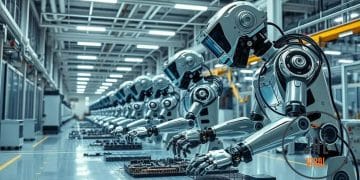Role of agentic AI in automating workplace tasks

The role of agentic AI in automating workplace tasks enhances efficiency, reduces costs, and transforms job dynamics by integrating technology that collaborates with human workers while creating new roles and skill requirements.
The role of agentic AI in automating workplace tasks is changing how we approach daily operations. Have you ever wondered how AI could streamline your workflow? In this article, we’ll dive into the essentials of this technology and its real-world applications.
Understanding agentic AI
Understanding agentic AI is essential as it reshapes our interaction with technology. It empowers tasks by learning from our actions. This intelligence isn’t just about automation; it’s about enhancing human capabilities.
What is agentic AI?
Agentic AI refers to systems that can make decisions and take actions independently, based on the data available. Unlike traditional AI, which operates solely on predefined rules, agentic AI learns from various inputs and improves its performance over time. This autonomy can lead to more efficient processes.
Benefits of agentic AI
Here are some key advantages:
- Increased productivity: Automating repetitive tasks allows employees to focus on higher-value work.
- Enhanced decision-making: AI analyzes data quickly, providing insights that humans might miss.
- Personalization: Agentic AI can tailor solutions to individual user needs, improving customer satisfaction.
By integrating agentic AI into work processes, companies can significantly boost their operational efficiency. This technology adapts to unique environments, making it a valuable asset in diverse industries.
Examples of agentic AI in use
Consider how agentic AI might automate routine tasks in different fields. In healthcare, it aids in predicting patient outcomes. In finance, AI helps detect fraudulent transactions.
Furthermore, the applications go beyond just task automation. For instance, agentic AI can assist in project management by optimizing schedules and resource allocation, which leads to smoother workflows.
As we grasp the concept of agentic AI, we see how it brings innovation to our daily operations. Embracing this technology isn’t just about efficiency; it also indicates a shift toward a more adaptive and intelligent work environment.
Key benefits of automating workplace tasks

Automating workplace tasks brings numerous advantages that can transform the way organizations operate. By using technology to handle repetitive tasks, businesses can see substantial improvements in efficiency.
Efficiency and Productivity
One of the most significant benefits of automation is increased efficiency. When machines handle monotonous activities, employees can focus on tasks that require creativity and strategic thinking. This shift not only boosts productivity but also enhances job satisfaction.
Cost Savings
Another advantage is the potential for cost savings. Automating tasks can lead to:
- Reduced labor costs as fewer employees are needed for manual tasks.
- Lower operational expenses due to fewer errors and less waste.
- Decreased time spent on routine activities, allowing quicker response to market changes.
Implementing automation can also help streamline processes, significantly reducing time spent on project completion.
Consistency and Accuracy
Automation improves consistency and accuracy in processes. Machines execute tasks the same way each time, minimizing the risk of human error. This consistency is vital for maintaining quality standards in products and services.
Moreover, as automation systems collect data, they can uncover insights that guide strategic decisions. When employees spend less time on repetitive tasks, they can analyze data more effectively, leading to smarter business strategies.
Enhanced Flexibility
With automation in place, companies can respond more swiftly to changes in demand or market conditions. The ability to scale operations up or down becomes easier, providing a significant competitive edge. This flexibility empowers businesses to adapt to new challenges efficiently.
Challenges in implementing agentic AI
While the potential of agentic AI is exciting, implementing it also comes with challenges. These hurdles can impact how effectively organizations adopt this technology. Understanding these obstacles is crucial for successful integration.
Data Privacy and Security
One major concern is data privacy and security. Organizations must ensure that sensitive information is protected while training AI systems. This challenge becomes more pronounced when AI learns from large datasets that include personal data. Companies need to comply with regulations and maintain user trust.
Integration with Existing Systems
Integrating agentic AI into current workflows can be complex. Many businesses rely on legacy systems that may not easily support new technologies. Ensuring seamless communication between old and new systems requires careful planning and often significant investment in infrastructure.
Training and Management
Organizations also face the challenge of training employees to work effectively with AI systems. This includes understanding how to interpret AI-generated insights. Without proper training, employees may resist using AI tools, limiting their effectiveness. Additionally, guiding the evolution of agentic AI requires ongoing management and adjustment, which can strain resources.
Moreover, there is a cultural aspect to consider. Shifting a workplace culture to embrace AI and technology necessitates leadership support and employee buy-in. A change in mindset is essential for successful adoption.
Ethical Considerations
Ethical concerns also arise with the use of agentic AI. Bias in AI algorithms can lead to unfair treatment of individuals. Organizations must take steps to audit their AI systems regularly and ensure that they operate fairly and transparently.
As businesses navigate these challenges, a strategic approach is essential. Addressing data privacy, integration, training, and ethical considerations can lead to a more successful implementation of agentic AI.
Real-world examples of agentic AI in action

Real-world applications of agentic AI showcase how this technology is transforming various industries. By examining these examples, we can better understand its impact and potential.
Healthcare Innovations
In healthcare, agentic AI is making waves. AI systems analyze patient data and help doctors diagnose diseases more accurately. For instance, AI algorithms can detect early signs of conditions like diabetes or cancer through imaging and data analysis. This early intervention can lead to better outcomes for patients.
Financial Services Enhancement
Another area where agentic AI excels is in financial services. Banks use AI to manage risks and detect fraud. AI systems can analyze transaction patterns, identifying unusual behavior in real time. This capability not only enhances security but also improves customer trust.
Manufacturing Efficiency
In manufacturing, companies leverage agentic AI to optimize production lines. AI monitors equipment and predicts when maintenance is needed, helping avoid costly downtimes. By streamlining operations, businesses increase productivity and reduce waste.
Retailers also benefit from agentic AI by personalizing customer experiences. AI analyzes buying habits to recommend products tailored to individual preferences. This level of customization can lead to higher sales and improved customer loyalty.
Smart Home Technology
Even in our homes, agentic AI is prevalent. Smart devices learn user preferences over time. For example, smart thermostats adjust temperatures based on when people are home. This not only enhances comfort but also leads to energy savings.
By exploring these real-world examples, we see that agentic AI is not just a concept; it is actively reshaping industries and enhancing day-to-day experiences.
Future implications of agentic AI on jobs
The future implications of agentic AI on jobs are vast and multifaceted. As this technology evolves, it is poised to alter the job landscape significantly. Understanding these implications can help workers and businesses prepare for upcoming changes.
Job Displacement
One significant concern is job displacement. As agentic AI automates repetitive and manual tasks, many roles may become obsolete. Industries like manufacturing and data entry are particularly at risk. Workers in these positions may need to reskill or shift to new roles.
Creation of New Jobs
Despite potential job loss, agentic AI is expected to create new jobs as well. The demand for roles that require human-AI collaboration will rise. For instance, jobs such as AI trainers, data analysts, and AI ethics consultants will become essential. The ability to work alongside AI systems will be a valuable skill in the future job market.
Skill Shift
The shift toward agentic AI will require a change in skills. Workers will need to develop skills in technology, problem-solving, and critical thinking. Digital literacy will become a top priority, as individuals must understand how to interact with AI systems.
Education and training programs will need to adapt to these changes, preparing the workforce for a more technology-driven environment. Continuous learning will be vital for staying relevant in the job market.
Workplace Dynamics
Agentic AI will also reshape workplace dynamics. Teams may become more collaborative as humans and AI systems work together. The workplace may evolve into a hybrid model where human creativity and AI efficiency combine for better outcomes.
As organizations adopt agentic AI, they may also need to rethink their strategies and management styles. Emphasizing both human and AI contributions will be crucial for success. Adapting to this new way of working will require open-mindedness and flexibility.
FAQ – Frequently Asked Questions about the Role of Agentic AI in Automating Workplace Tasks
What are the main benefits of implementing agentic AI in the workplace?
Implementing agentic AI can increase efficiency, reduce costs, and enhance accuracy in tasks, leading to improved productivity.
How can agentic AI impact job roles in my organization?
Agentic AI may lead to job displacement in some areas, but it will also create new roles that require collaboration with AI technologies.
What skills will be important for employees as agentic AI becomes more prevalent?
Skills in technology, problem-solving, and critical thinking will be essential as the workforce adapts to working alongside AI.
How can I ensure ethical use of agentic AI in my business?
Regular audits and transparency in AI decision-making processes are crucial to maintain ethical standards and avoid biases.





